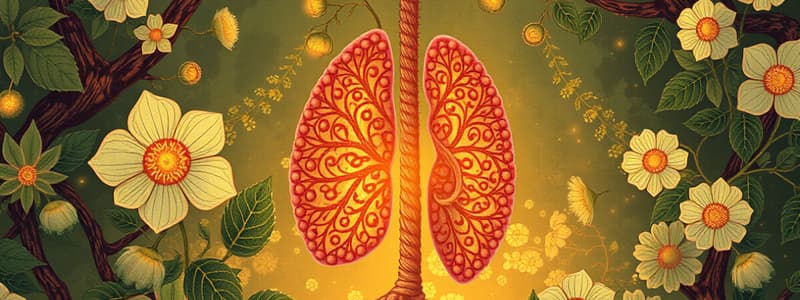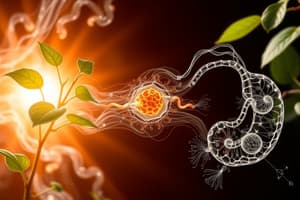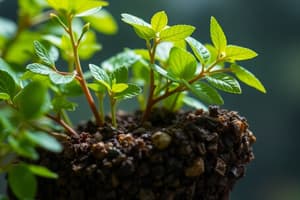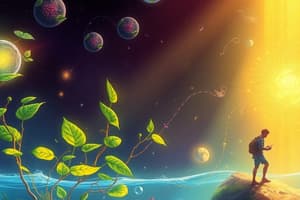Podcast
Questions and Answers
What is the overall reaction for photosynthesis?
What is the overall reaction for photosynthesis?
6 CO2 + 6 H2O + Light → C6H12O6 + 6O2
How does photosynthesis compare to the overall reaction for cellular respiration?
How does photosynthesis compare to the overall reaction for cellular respiration?
They are opposites. Reactants for photosynthesis are products for cellular respiration, and reactants for cellular respiration are products for photosynthesis.
Where does the energy for photosynthesis come from?
Where does the energy for photosynthesis come from?
The sun or solar energy.
What plant pigments are involved in photosynthesis?
What plant pigments are involved in photosynthesis?
Explain why chlorophyll appears green to us.
Explain why chlorophyll appears green to us.
How does the amount of energy in light change as the wavelength increases?
How does the amount of energy in light change as the wavelength increases?
In what organelle of plant cells does photosynthesis take place?
In what organelle of plant cells does photosynthesis take place?
What are the two stages of photosynthesis?
What are the two stages of photosynthesis?
In which part of the chloroplast does each stage of photosynthesis occur?
In which part of the chloroplast does each stage of photosynthesis occur?
What happens to water molecules in the light reactions?
What happens to water molecules in the light reactions?
What photosynthesis waste product is formed in the light reactions?
What photosynthesis waste product is formed in the light reactions?
What two products of the light reactions are used up in the Calvin cycle?
What two products of the light reactions are used up in the Calvin cycle?
What happens to carbon dioxide molecules in the Calvin cycle reactions?
What happens to carbon dioxide molecules in the Calvin cycle reactions?
How can cells store the sugar that is produced in photosynthesis?
How can cells store the sugar that is produced in photosynthesis?
What does light reactions produce?
What does light reactions produce?
What is stomata?
What is stomata?
What are mesophyll cells?
What are mesophyll cells?
What is a chloroplast?
What is a chloroplast?
What is a thylakoid?
What is a thylakoid?
During the fall, what causes the leaves to change colors?
During the fall, what causes the leaves to change colors?
What is the Light Independent Reaction?
What is the Light Independent Reaction?
What is the Light Dependent Reaction?
What is the Light Dependent Reaction?
Flashcards are hidden until you start studying
Study Notes
Photosynthesis Overview
- Photosynthesis overall reaction: 6 CO2 + 6 H2O + Light → C6H12O6 + 6O2
- Photosynthesis and cellular respiration are opposite reactions, with reactants and products switching places.
Energy Source
- Solar energy is the primary source of energy for photosynthesis.
Plant Pigments
- Chlorophyll pigments are essential for capturing light energy during photosynthesis.
- Chlorophyll appears green because it reflects green light while absorbing other colors like red, blue, and violet.
Light Energy and Wavelength
- Energy inversely relates to wavelength: longer wavelengths have less energy, while shorter wavelengths have more energy.
Cellular Structure
- Photosynthesis occurs in chloroplasts, specifically within thylakoid membranes and the stroma.
- Light reactions occur in the thylakoid membrane; the Calvin cycle takes place in the stroma.
Light Reactions
- Water molecules are split during light reactions, providing electrons to photosystem II.
- Oxygen is produced as a waste product in light reactions.
- NADPH (electron carrier) and ATP (energy molecule) are produced and utilized in the Calvin cycle.
Calvin Cycle
- Carbon dioxide is converted into sugar during the Calvin cycle.
- Fixed sugar can be stored as starch.
Stomata and Gas Exchange
- Stomata are pores on a plant's surface that facilitate the exchange of gases and water with the atmosphere.
Mesophyll Cells
- Mesophyll cells contain chloroplasts and support photosynthesis within the leaf structure.
Chloroplast Structure
- Chloroplasts contain an inner and outer membrane, stroma, thylakoids, and granum for photosynthesis.
- Thylakoids stack to form granum, increasing surface area for photosynthesis.
Seasonal Changes
- In fall, reduced chlorophyll reveals other pigments like carotenoids, causing leaves to change color.
Light Independent Reactions (Calvin Cycle)
- Requires products from light-dependent reactions to function.
- Enzymatically fixes carbon dioxide into an organic form (glucose) using ATP for energy and NADPH for electron supply.
- Converts fixed carbon dioxide, ATP, and NADPH into sugar while reverting ATP to ADP and NADPH to NADP+.
Light Dependent Reactions
- Located in the thylakoids where chlorophyll captures solar energy and performs electron transport.
Studying That Suits You
Use AI to generate personalized quizzes and flashcards to suit your learning preferences.




